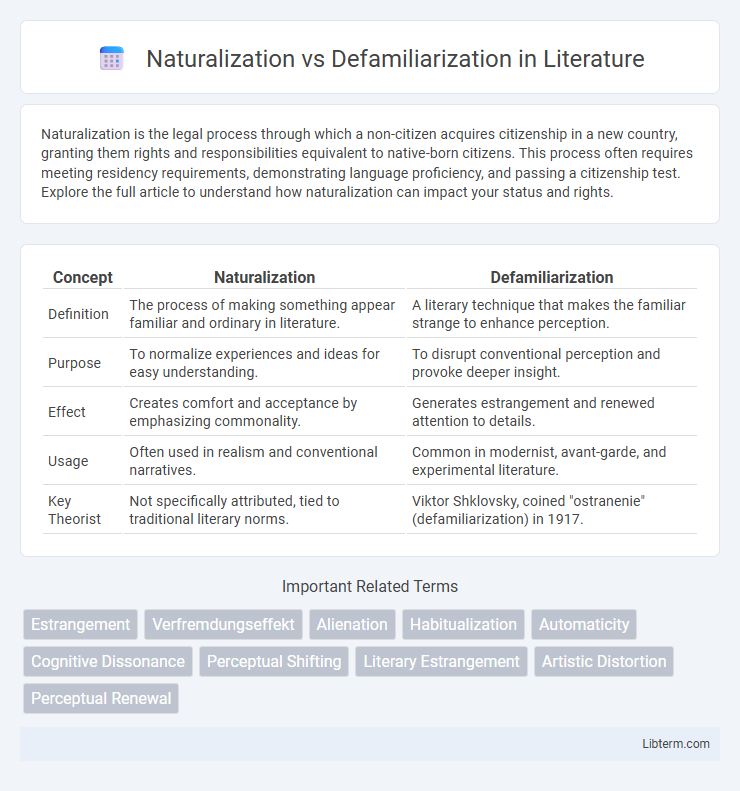Naturalization is the legal process through which a non-citizen acquires citizenship in a new country, granting them rights and responsibilities equivalent to native-born citizens. This process often requires meeting residency requirements, demonstrating language proficiency, and passing a citizenship test. Explore the full article to understand how naturalization can impact your status and rights.
Table of Comparison
| Concept | Naturalization | Defamiliarization |
|---|---|---|
| Definition | The process of making something appear familiar and ordinary in literature. | A literary technique that makes the familiar strange to enhance perception. |
| Purpose | To normalize experiences and ideas for easy understanding. | To disrupt conventional perception and provoke deeper insight. |
| Effect | Creates comfort and acceptance by emphasizing commonality. | Generates estrangement and renewed attention to details. |
| Usage | Often used in realism and conventional narratives. | Common in modernist, avant-garde, and experimental literature. |
| Key Theorist | Not specifically attributed, tied to traditional literary norms. | Viktor Shklovsky, coined "ostranenie" (defamiliarization) in 1917. |
Understanding Naturalization in Literature
Naturalization in literature refers to the process by which cultural norms, values, or ideologies become taken for granted as natural or common sense, often obscuring their constructed nature. This process contrasts with defamiliarization, which aims to make the familiar strange, encouraging readers to question and re-examine their assumptions. Understanding naturalization helps reveal how narratives reinforce dominant power structures and maintain social order through seemingly natural representations.
Defining Defamiliarization: A Literary Device
Defamiliarization is a literary device that makes familiar objects, concepts, or language appear strange or new, compelling readers to perceive them differently. It challenges automatic perception by disrupting conventional associations, enhancing the depth and intensity of the experience. This technique, often employed in modernist literature, revitalizes ordinary narratives through innovative descriptions and altered perspectives.
Origins and Historical Context of Both Concepts
Naturalization and defamiliarization originate from distinct philosophical and literary traditions, shaping their conceptual frameworks. Naturalization, rooted in Enlightenment thought, emphasizes making complex ideas and phenomena seem ordinary and comprehensible by integrating them into familiar contexts. Defamiliarization, coined by Russian Formalist Viktor Shklovsky in the early 20th century, seeks to disrupt habitual perception by presenting common objects or experiences in unfamiliar ways, thereby renewing the viewer's or reader's engagement with reality.
Key Differences Between Naturalization and Defamiliarization
Naturalization involves making foreign elements or cultural practices appear natural and familiar within a new context, often smoothing over differences to promote assimilation. Defamiliarization, by contrast, intentionally makes the familiar seem strange or new, encouraging critical perception and fresh understanding. Key differences lie in their objectives: naturalization seeks acceptance and normalization, while defamiliarization aims to challenge perceptions and reveal underlying assumptions.
Functions of Naturalization in Narrative
Naturalization in narrative functions to make unfamiliar cultural elements appear ordinary, facilitating audience comprehension and acceptance. It streamlines complex or alien concepts by embedding them seamlessly into the story's context, enhancing relatability and immersion. This process contrasts with defamiliarization, which deliberately disrupts recognition to provoke critical reflection and deeper engagement.
Purpose and Impact of Defamiliarization
Defamiliarization aims to disrupt automatic perception by presenting common objects or concepts in unfamiliar ways, forcing audiences to critically engage and rethink their assumptions. Its purpose is to challenge established norms and reveal deeper meanings, often provoking reflection and heightened awareness. This technique impacts literature and art by enhancing the viewer's or reader's consciousness, making the ordinary appear extraordinary and encouraging deeper cognitive and emotional responses.
Techniques Used in Naturalization and Defamiliarization
Naturalization employs techniques such as familiar language, conventional narrative structures, and culturally accepted symbols to create a sense of normalcy and ease for the audience. Defamiliarization, on the other hand, uses unexpected metaphors, fragmented syntax, and unusual perspectives to disrupt typical perception and provoke critical reflection. These contrasting methods manipulate cognitive processing to either conceal or highlight the constructed nature of texts and experiences.
Examples from Classic and Modern Texts
Naturalization in literature normalizes cultural norms and ideologies, as seen in Jane Austen's "Pride and Prejudice," where social class distinctions are presented as accepted realities. Defamiliarization disrupts readers' perceptions by presenting common experiences in unusual ways, exemplified by Franz Kafka's "The Metamorphosis," which reimagines a man transformed into an insect to challenge notions of identity and alienation. Modern texts like Kazuo Ishiguro's "Never Let Me Go" further employ defamiliarization to question ethical boundaries in human cloning, contrasting with naturalized narratives that depict technology's benefits without critique.
Effects on Reader Perception and Interpretation
Naturalization in literature smooths language to make narratives familiar and easily digestible, which helps readers quickly connect with themes but may limit deeper analysis. Defamiliarization disrupts ordinary language with unexpected or strange expressions, compelling readers to reconsider common ideas and engage more critically with the text. These contrasting techniques shape reader perception by either fostering instant empathy or provoking profound reflection and reinterpretation.
Relevance of Both Approaches in Contemporary Literature
Naturalization in contemporary literature often makes complex themes more accessible by embedding them into familiar contexts, enhancing reader engagement and comprehension. Defamiliarization challenges conventional perspectives by presenting ordinary elements in unfamiliar ways, prompting critical reflection and deeper cognitive involvement. Both approaches remain relevant as they balance readability with innovation, enriching literary diversity and reader experience.
Naturalization Infographic

 libterm.com
libterm.com